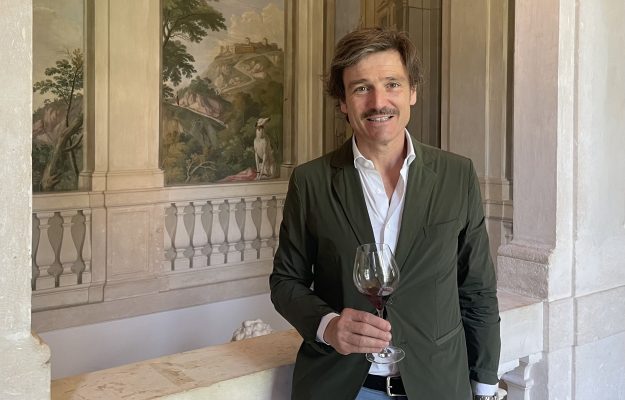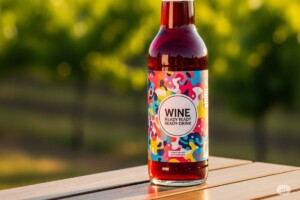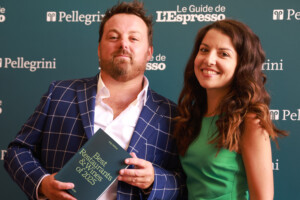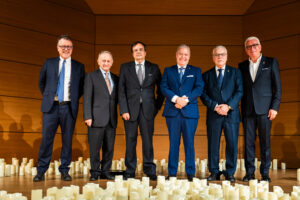The Institute of Masters of Wine, the most authoritative and oldest organization dedicated to the knowledge and trade of wine (of which 412 professionals from 31 countries are members) welcomes a new Italian Master of Wine: Andrea Lonardi, class of 1974, born in Valpolicella, with a degree in Agriculture from Bologna and a Master’s in Management Control from the Grande Ecole of Montpellier, an experience that opened the doors first to a collaboration with Washington State University, then to a long managerial career. After training internships in Languedoc and Sonoma, Lonardi joined the Top Wine Division of Gruppo Italiano Vini (Giv), handling marketing & sales. In 2005 he led the project to reorganize the viticultural part of the group, which led him to work in the most important Italian wine territories, following more than 1,000 hectares of vineyards from the Alps to Sicily, in the role of viticultural coordinator of Gruppo Italiano Vini. From 2008 he also began to take care of the oenological part for some of the group’s projects. In 2012 he is ready for a new challenge in the role of Chief Operating Officer of Bertani Domains, now Angelini Wines & Estates, where he is still in charge of production reorganization, development of the group’s concepts, construction of the product portfolio and business development.
At WineNews, the study and professional path, begun in 2014, that led the Coo of Angelini Wines & Estates, Andrea Lonardi, to become the second Italian Master of Wine. And, above all, the prospects that will face a profile quite different from most colleagues, decidedly more comfortable in the role of manager than in that of communicator “with a glass in his hand”. Andrea Lonardi’s contribution will be a different - but equally pregnant - one to the whole of Italian wine, based on the awareness of being able to count on territories of great excellence, and on managerialism and professionalism of the highest level: it is to these that we must look, without the need to copy distant and, culturally, distant models. All this, of course, with an analytical, serious and transparent approach, in which knowledge sharing, as happens in the path of every Master of Wine, becomes an exceptional multiplier.
What does the arrival of the second Italian Master of Wine entail?
For me, it is not a matter of ranking: only when all three Italians in the MW study group - besides me, and Gabriele Gorelli, the first MW from our country, and Pietro Russo, now on the third step of the path - have this title in our hands will we be able to say that Italy of wine has finally succeeded in giving an important message in the international wine-industry. Together we have started this journey, together we have shared every single step, because only together are we able to have such broad experiences, which go far beyond the title. Which is certainly important, but the fundamental thing is the person on whom it is grafted, and for the three of us this path of growth was fundamental. The MW is the highest prestige award in the wine world, the Wine Olympiad. It is a very difficult exam, alternating between tasting batteries and essayes (themes) on an Oxford-Cambridge basis, so extremely complicated for us Latinos. You can also become a MW by studying a lot, by just committing yourself to this thing, but the biggest risk you run is to want the title and not the change of operating system - made up of hard and soft skills - that this program can generate on a human and professional level. In this sense, our stories and backgrounds are profoundly different: Gabriele Gorelli is a wine hedonist, he is a professional who knows all the best producers and wines in the world. He is an aesthete of wine and will be able to help Italy learn about these dynamics in depth. Pietro Russo, on the other hand, is a winemaker with a strong Sicilianity, and he will make a great contribution to this region. He has an analytical, serious and transparent approach to wine. Apart from that, I believe that Italy will be able to bring the concept of wine manageriality to the MW, thanks to our professional figures full of creativity and entrepreneurial spirit. International wine has a great hunger for these values.
So doesn’t another wine communicator come along?
MWs are mostly communicators, then come educators, then some winemakers, and finally managers. I belong to the latter category, the smallest and newest of the MWs. These include some very successful wine-business people, like David Gleave of Liberty Wines, and some newer ones like Justin Knock, Christophe Heynen, and Nick Bielak. The latter three were the ones who intrigued and inspired me; they are MWs who do not constantly have a glass in their hand, but are involved in development, planning, organizing, and have vision. Indeed, wine is not just about rotating a glass, tasting a wine, guessing its provenance and being good at managing social media. Wine is also thinking about its stylistic, economic, social and production future. Wine is talking to winemakers, salespeople and entrepreneurs who want to make an idea a potential success. Wine is the ability to listen, not only to what is in the glass, but also to what a territory can produce or what the consumer or markets may demand. So I wanted to challenge myself in a research where I could combine these different approaches.
I don’t like poems, I respect so much those who, with a glass in their hand, win people over, but I can’t do it. I am a creative person, but I need to see objective practical results. I like to measure things you can think of, bring them back to the analytical component and methods to develop new results. Think, for example, of how a small-to-medium group like Angelini Wines & Estates has been able to count on weekly reporting for a number of years, with which it opens each work week by updating the working group of the results achieved and giving short (monthly) and medium (quarterly) period projections.
But then with the MW what are you going to do? What changes from tomorrow?
I will continue to do the same things. I have been immensely fortunate over the years: to be able to directly practice what I was seeing and learning in the MW on practical, real-world cases. Over these years, thanks to Angelini Wines & Estates, I have been able to develop a series of successful, innovative and contemporary projects, in which I have put not only the classic great commitment, but also a thread of courage and vision, driven by the passion and stimulus generated by this unique program. The project of relaunching Bertani through the concept of style, the slopes of Montalcino (the Brunello Vineyards), the focus on Sangiovese from three different appellations (Brunello di Montalcino, Chianti Classico and Nobile di Montepulciano), “The Library” project at Bertani, the commercial development of Val di Suga in the U.S. with Wilson Daniels have been my essay areas. Now, with the MW title I would like to give even more focus, stylistic planning, managerial organization and commercial direction to the fine wines project of Angelini Wines & Estates.
What are the most beautiful results obtained through MW?
The first: having changed my soft skills. I am a creative and instinctive person, and the MW path has taught me discipline and strategy, and to look for areas of improvement and identify how and with whom I can work on them. To help me in this I underwent intense training sessions with a coach, Professor Andrea Cipriani. Of the three, I was the first to pass the theory exam block. This is a step that requires you to write, over the course of five days, 13 essayes on topics ranging from viticulture, winemaking, quality control, marketing and contemporary issues. However, I got stuck in the tasting part, apparently the one I should have passed first, given my background. It was my constant quest outside the box that prevented this second step. Today, thanks to these challenges, I have acquired a natural flexibility and ability to read when the methodological component, discipline, and rigor are needed and when, on the other hand, the creative component can be added to it, which is what allows one to excel and to become pioneering and identity-driven.
The second: the thinking and the desire to constantly transfer this way of thinking to the work group. People are at the heart of the MW program, just as they are the engine of companies, and working on them is what I am most passionate about. I am proud of some of our guys in Angelini Wines & Estates, who have made great strides over the years. They are fabulous talents for Italian wine, and I would like to see them finally take off and become benchmark wine people in the regions where they operate.
The third has not happened yet; I wish more Italian wine managers could take this path. Italy is made up of leading companies from an entrepreneurial point of view, much better than those we think we find abroad. However, we must have the strength and ability to consolidate our models, we must identify our values and set our priorities, and know how to direct our energies with foresight and constancy. Italian wine has and can provide great opportunities, it does not need to ape reference models such as Bordeaux, Burgundy, Rhone, Napa Valley or Champagne. If we do not understand this, we run the risk of remaining lacking credibility in the eyes of major international opinion leaders. Territories and their leaders need to cultivate their own production methodology, their own identity and consequently their own recognizability. Barolo, Brunello, Bolgheri and some top players in Italian wine-such as Antinori, Ornellaia and Gaia-have become true leaders of this way of doing things, of this ability to transfer solidity, security, consistency in production, and for this they are fertile substrate for the creation of value through the international community. Today, to do this, trained human resources are needed, and a MW can undoubtedly be the accelerator to acquire method and these development processes.
What does this path summarize?
My final thesis, what the British call a research paper, “Pergola and VSP in Valpolicella: How Labor Demand and Current Challeges Impact Training System Choices”. This is an “ostensibly” technical paper dedicated to Valpolicella, but instead a practical example of a layered multidisciplinary approach. Valpolicella is being called upon to make a stylistic and managerial change that requires a different vision and business positioning choices than in the past. To be able to do this, it first requires authority and recognition in the international community, which is what this work aims for. A work that remains “for” and “of” the denomination, but actually provides insights for the entire wine world. Comparing forms of farming-such as Controspalliera and Pergola-will become an increasingly topical issue given climate change and labor shortages. Bringing together climatic, quality, economic, social and legislative issues was proof that with a rigorous method, objective results can be obtained. The MW provided me with an opportunity to experiment and test myself for an area to which I felt I needed to leave a recognition and a starting point for a needed renewal.
MWs often represent a wine region: so has a Veneto MW arrived?
My 10 years in Gruppo Italiano Vini (Giv) gave me a cross-sectional vision and knowledge about Italy. We controlled over 1,000 hectares of vineyards, from the Alps (Nino Negri) to Sicily (Rapitalà). It was a group of very high-level managers, and I, at 33, was the youngest. We were in the midst of the Italian wine production revolution, and we were able to develop management control concepts for the production area, bringing the first prototypes of precision viticulture and soil investigation. We pioneered irrigation management in Mediterranean climates by developing water stress indices for native Italian varieties.
Then, from 2012, came Bertani Domains (now Angelini Wines & Estates), a project that evolved almost concurrently with my entry into MW. In this experience I divided myself mainly between Tuscany, Valpolicella and foreign markets. And that is how I feel today: a Tuscan when I am in Verona and a Venetian when I am in Tuscany. Tuscany has taught me the concept of quality, style but above all the ability to create prestige and value, even if it is sometimes very slow and complicated. Veneto, on the other hand, boasts great entrepreneurship, but the limitation of always having to run, which is expressed in a tireless production capacity. Today Angelini Wines & Estates and our team combine these two regions and their positive sides. Bertani has grown culturally and commercially thanks to a Tuscan management approach, while our Tuscan companies are examples of efficiency and effectiveness in their respective territories. In 10 years we have regenerated Val di Suga, bringing it to the top 15 wineries in Montalcino, and in this, the right mix was needed, which MW certainly stimulated.
How are the MWs changing?
The world and the role of the MW are changing a lot. What we know best is their connection to the final part, that of tasting and communication. Wine, and especially Italian wine, on the other hand, needs strategy and planning, to follow patterns and logic, to have discipline and cultivate the goal of identity, of prestige. The program gives the opportunity to study patterns and develop hard and soft skills of this kind. It is a network of information and operational contacts around the world and in all segments of the wine-industry. These are the reasons I chose it and the things I focused on. To some I may seem like an anomalous MW, but on the contrary I feel extremely forward-looking.
How do you feel?
Fortunate to have had the humility to take advice and to have cultivated diverse and top-notch mentorships. It has been something I have researched and practice methodically. I curate technical, methodological, managerial, and human resource management comparisons, but at the same time I also stimulate my mind on topics outside of wine. For years I have been investing in high-level coaching and continuously planning new horizons for growth. I love to study the skills of those in front of me and try to capture the best. When I can I go out of my way to try to instill these things in my team as well. MW has been the ideal context and substrate to stimulate and develop these soft skills.
But what is the MW community like?
It is a unique environment, in some ways diabolical, but at the same time a great flywheel of energy and stimulation. It is a great club based on the concept of critical friends, where judgments are always extremely strict and selective: that is why many people drop out. However, they are judgments that are not meant to penalize, but rather to highlight where there is room for improvement. It is a club in which the main rule is the share that creates a horizontal system, as the professional world today dictates. It is a club in which leaders base their strength on prestige, not leadership. The MW community does not give impositions and there are no controls; it is an environment in which leadership based on authority prevails and is recognized by the group. That is why people come together and seek support, because it is not the individual, but the working group, that emerges. Gabriele, Pietro and I are an example of this, and these are the elements that make the Institute of Masters of Wine still interesting and contemporary from an educational point of view.
Who are the people you would like to thank?
My wife Alberta and my daughters Maria and Margherita: never for a second did they doubt that this recognition would not come. Esteem is fundamental in self-confidence. Gabriele Gorelli and Pietro Russo, my two traveling companions: our complementarity must be an example of team building and of the fact that in a group what is impossible individually is surmountable. And then who pushed me to make this choice, the top management of Angelini Wines & Estates and my team for letting me do this. Andrea Cipriani, a coaching professional with whom I have been collaborating for three years. And finally some Mws, on all of them Yiannis Karakasis, Michelle Cherutti-Kowal and Chistophe Heynen.
Copyright © 2000/2025
Contatti: info@winenews.it
Seguici anche su Twitter: @WineNewsIt
Seguici anche su Facebook: @winenewsit
Questo articolo è tratto dall'archivio di WineNews - Tutti i diritti riservati - Copyright © 2000/2025

























































































































































































